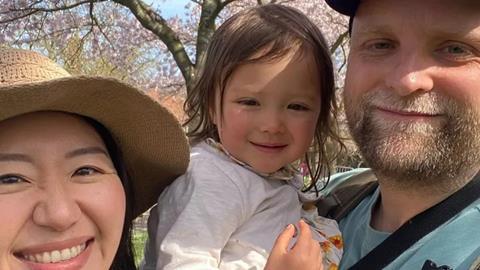The Talent Manager’s Sarah Lee calls for the industry to reset its freelancer relations
The tragic death of John Balson has underscored in a distressing and shocking way the fragile ecology in which freelancers exist in our industry.

John took his own life on 17 May after suffering from vestibular migraine disorder which he said in a letter left to his family he felt was “caused by the chronic stress of working in the TV industry”.
He leaves behind a wife, a three year old daughter and a new baby due in August.
Shortly after John’s death a friend and colleague got in touch suggesting his family wanted The Talent Manager to help spread John’s warning about the state of the industry. An experienced factual producer and reporter who had worked on projects for Netflix, CBS, and Channel 4, John had hoped his experiences would be a wake-up call for change.
Last week I spoke to John’s widow and mother and heard their truly heartbreaking tale.
Vestibular migraine disorder is a neurological disorder known to cause intense and acute pain often for an indeterminate amount of time. John’s suffering was immense.
What started as minor discomfort soon became so limiting that he could barely cope walking his daughter to preschool. His death came just eight weeks after his first symptom emerged. Unable to escape this severe pain and suffering from chronic panic disorder and insomnia, he passed away alone. Mental health is a complex, multifaceted area, and charities advise that no single factor should be attributed to an individual’s decision to end their life.
But John’s widow, Yumeno, questions whether the industry provided appropriate duty of care to her husband. She has spoken about his fears of being blacklisted if he walked away from his job, and John described the industry as ‘exploitative’ and said he felt professionally “expendable”.
In his letter to the family that has been shared with The Talent Manager and Bectu and is quoted here with the family’s blessing, John said: “There was never any care for how the hours or the stories affected us.”
In a document he wrote chronicling his medical history he acknowledges having spent the last four years working excessive irregular hours dealing with the most horrific murders and content.
“I just hope this helps make some changes that finally need to be made to stop this happening to anyone else. If anyone is reading this who works in that industry or another exploitive industry, stop working so hard and take a break, and don’t be so hard on yourself to make money. It is not worth risking a fate as grotesque as this.”
The pressures on freelancers in TV are familiar: long and unpredictable hours; stress; excessive demands; financial uncertainty; lack of career planning; informal recruitment processes; bullying and harassment; discriminatory behaviour. The list goes on.
We are all aware too of the perfect storm of economic pressures that have beset our industry – from the decline in TV ad revenue to the fall in streamers’ subscribers to the cumulative impact of below-inflation license fee settlements. The worry is that these will be used as a rationale to continue as before, like the Conservative government’s justification for its austerity programme.
But the reality is a lot can be done even without a big economic outlay. Bectu has been campaigning hard to bring broadcasters and other stakeholders together to improve freelancers’ working lives in myriad simple ways. So too the Film & TV Charity. The Time Project - an initiative set up to address overwork and monitor freelancers’ hours could be adopted by C4 and other organisations and embedded in their codes of conduct.
In the area that I work – recruitment – some small changes in culture and behaviour would have an outsized benefit for freelancers’ well-being. In the last few months, we’ve been talking to scores of MDs and recruiters – at broadcasters and indies - about addressing some of those recruitment-related issues, in particular, the lack of feedback and haphazard interview processes.
What’s been notable is how much more receptive the companies we’ve been talking to have been to ideas for making - albeit modest – changes in order to support freelancers better. My sense is that there’s a wider appreciation than I can remember in my 30+ years in the industry, that the ‘social contract’ with freelancers needs realigning.
But there now needs to be clear, consistent leadership from the top – the networks and commissioners – not simply to outsource responsibility to indies, and for all levels of the employment hierarchy to engage actively with ways to treat freelancers better. The good news is that a lot of resources needed to do this already exist – from the FTVCs Mental Health Toolkit to the HR resources produced by ScreenSkills or the Time Project. Their use simply needs to be embedded across all productions.
It’s too late for John but as an industry we must do better and ensure that no freelancer ever feels expendable again.
Sarah Lee is creative director & founder of The Talent Manager
Anyone experiencing difficulties with their mental health can contact the Samaritans, which offers support day or night, 365 days a year. You can call them for free on 116 123, email them at jo@samaritans.org, or visit www.samaritans.org to find your nearest branch.





























No comments yet